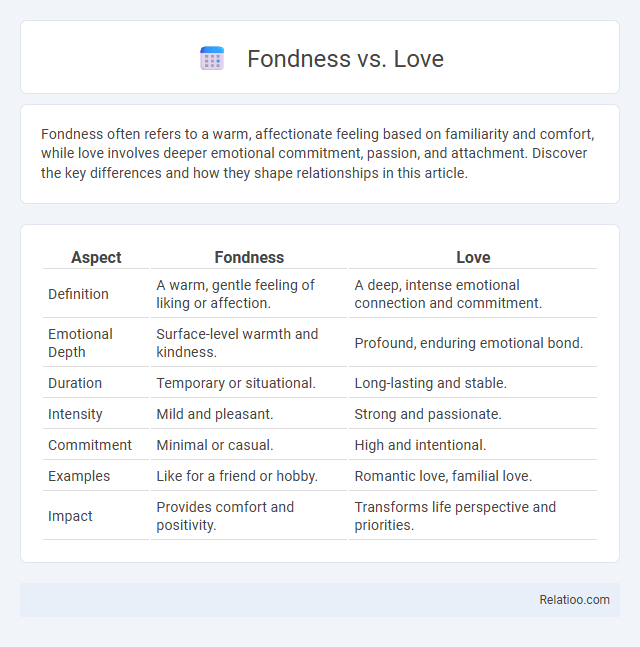Fondness often refers to a warm, affectionate feeling based on familiarity and comfort, while love involves deeper emotional commitment, passion, and attachment. Discover the key differences and how they shape relationships in this article.
Table of Comparison
| Aspect | Fondness | Love |
|---|---|---|
| Definition | A warm, gentle feeling of liking or affection. | A deep, intense emotional connection and commitment. |
| Emotional Depth | Surface-level warmth and kindness. | Profound, enduring emotional bond. |
| Duration | Temporary or situational. | Long-lasting and stable. |
| Intensity | Mild and pleasant. | Strong and passionate. |
| Commitment | Minimal or casual. | High and intentional. |
| Examples | Like for a friend or hobby. | Romantic love, familial love. |
| Impact | Provides comfort and positivity. | Transforms life perspective and priorities. |
Understanding the Concepts: Fondness vs Love
Fondness refers to a gentle affection or liking often based on familiarity and positive experiences, while love encompasses deeper emotional attachment, commitment, and passion. Understanding the concepts of fondness versus love helps you recognize the varying intensities and dimensions of emotional bonds in relationships. Distinguishing between these feelings clarifies your emotional needs and expectations for meaningful connections.
Key Emotional Differences Between Fondness and Love
Fondness is a gentle affection characterized by warm feelings and comfort, while love involves a deeper emotional commitment and passion that often includes vulnerability and sacrifice. Your fondness for someone may be based on familiarity and positive experiences, whereas love tends to encompass strong attachment, trust, and a desire for long-term connection. Understanding these emotional differences helps clarify your feelings and navigate relationships more effectively.
Psychological Roots of Fondness and Love
Fondness stems from positive associations and repeated pleasurable experiences that build comfort and attachment in Your mind, rooted in familiarity and emotional safety. Love, however, engages deeper psychological processes involving commitment, vulnerability, and a complex blend of passion, intimacy, and trust shaped by neurochemical responses like oxytocin release. Understanding these roots highlights how fondness forms the foundation for love's evolutionary and psychological complexity.
Signs You're Experiencing Fondness, Not Love
Signs you're experiencing fondness, not love, include feeling comfortable and appreciative of someone's presence without intense emotional attachment or a deep desire for long-term commitment. Fondness often involves warm feelings and affection based on familiarity, whereas love typically involves deeper passion, vulnerability, and prioritizing your partner's happiness. Recognizing these distinctions helps you understand your emotions and the nature of your relationships.
How Love Develops From Fondness
Fondness represents an initial positive feeling characterized by affection and enjoyment of someone's company, which often serves as the foundation for deeper emotional bonds. As shared experiences and trust accumulate, fondness matures into love, marked by commitment, empathy, and a profound emotional connection. This progression reflects psychological studies indicating that love develops from sustained positive interactions and mutual understanding, transforming simple liking into lasting attachment.
The Role of Attachment in Fondness and Love
Attachment plays a crucial role in differentiating fondness from love, as fondness often arises from positive memories and mutual enjoyment without deep emotional dependence. Love involves a stronger attachment bond characterized by a desire for emotional closeness, security, and long-term commitment. Understanding how your attachment style influences these feelings can help you navigate your relationships more effectively.
Manifestations in Relationships: Comparing Fondness and Love
Fondness in relationships manifests through warmth, appreciation, and comfort, often reflecting a stable, affectionate connection without intense emotional depth. Love demonstrates deeper commitment, passion, and emotional involvement, influencing behaviors like sacrifice, support, and vulnerability. Your understanding of these distinctions helps clarify emotional experiences and guides how you nurture meaningful bonds.
Long-term Impacts: Fondness Versus Love
Fondness often serves as a gentle, enduring affection rooted in familiarity and comfort, which supports stable long-term relationships but may lack the depth required for profound personal growth. Love, however, creates stronger emotional bonds that drive vulnerability, trust, and transformative experiences, significantly impacting your mental and emotional well-being over time. Understanding these distinctions helps you nurture connections with lasting value and emotional resilience.
Navigating Relationships When Emotions are Unclear
Understanding the differences between fondness, love, and infatuation helps you navigate relationships when emotions feel unclear. Fondness often reflects a warm, affectionate feeling based on familiarity, while love involves a deeper, committed emotional bond. Infatuation is marked by intense, sometimes irrational attraction that may not sustain over time, making clarity essential for healthy relationship growth.
Choosing Between Fondness and Love: Building Lasting Connections
Choosing between fondness and love involves recognizing the depth and intensity of emotional bonds; fondness reflects warm, affectionate feelings often based on familiarity, while love encompasses a profound commitment and passion. Building lasting connections requires nurturing fondness through trust and shared experiences as a foundation that can evolve into deep love over time. Understanding these emotional layers helps individuals foster meaningful relationships that endure challenges and grow stronger.

Infographic: Fondness vs Love
 relatioo.com
relatioo.com